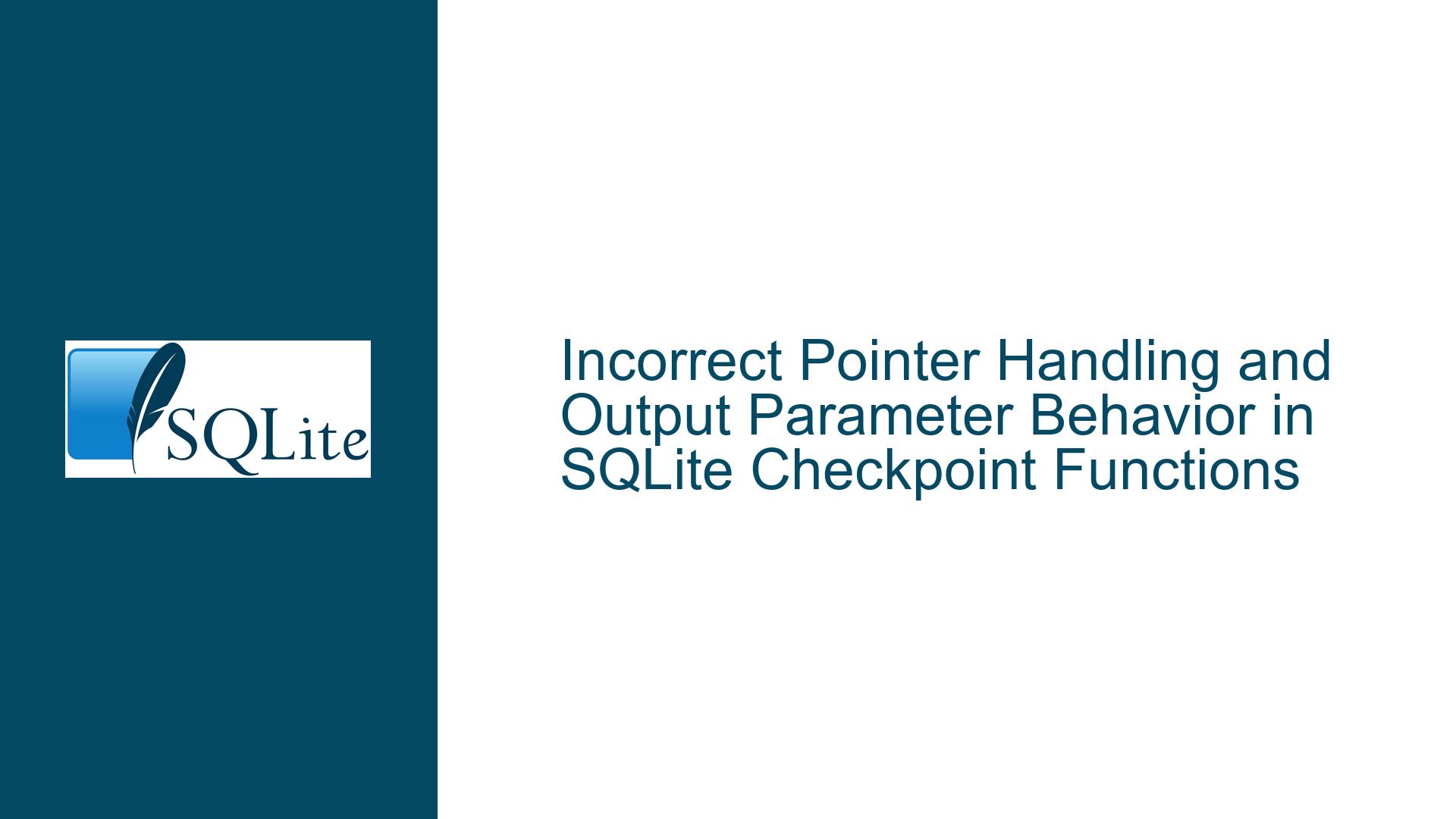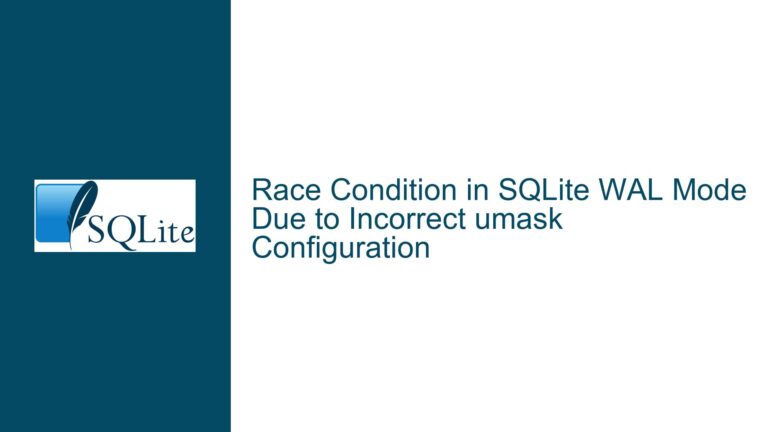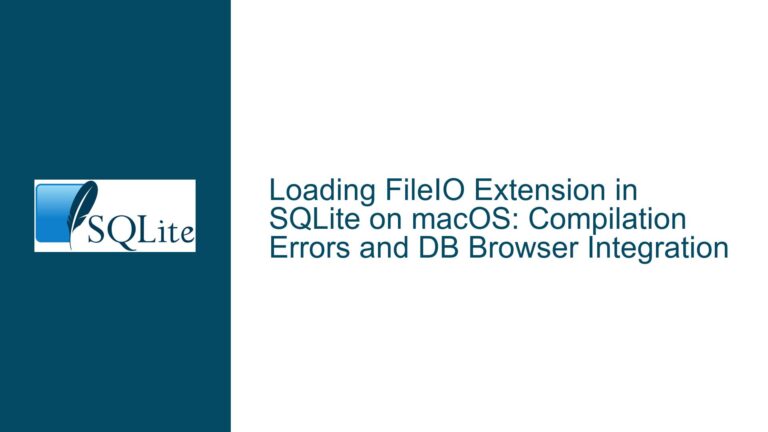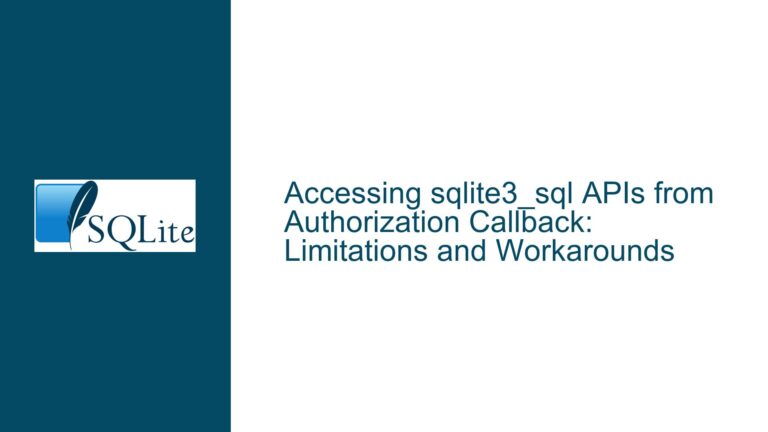Incorrect Pointer Handling and Output Parameter Behavior in SQLite Checkpoint Functions
Issue Overview: Pointer Nullification vs. Value Assignment in sqlite3Checkpoint
The core issue revolves around the behavior of the sqlite3Checkpoint function in SQLite, specifically how output parameters pnLog and pnCkpt are managed during the checkpointing process. The sqlite3Checkpoint function is responsible for executing Write-Ahead Logging (WAL) checkpoints, which synchronize data between the WAL file and the main database file. Checkpointing ensures database consistency and reduces recovery time after crashes. The function accepts two output parameters: pnLog (the number of frames in the WAL) and pnCkpt (the number of frames checkpointed).
In the current implementation of SQLite 3.43.1, the code within the loop iterating over databases contains the following lines:
pnLog = 0;
pnCkpt = 0;
This code nullifies the pointers themselves rather than setting the values they point to. The user argues that this should instead dereference the pointers to set their target values to zero:
*pnLog = 0;
*pnCkpt = 0;
The distinction is critical. Nullifying the pointers (setting them to NULL) prevents subsequent code from accessing the memory they originally pointed to, whereas setting their target values to zero preserves the pointers but initializes the stored integers. This becomes significant when the loop processes multiple databases. If the pointers are nullified, subsequent iterations cannot write to the original memory locations, potentially leaving the output parameters with incomplete or undefined values.
A secondary concern involves the accumulation of pnLog and pnCkpt values across multiple databases. If a system has multiple WAL-enabled databases, the checkpoint operation might iterate over each database. The user questions whether the current implementation accumulates results across these databases or only reports values from the first iteration. For example, if three databases are checkpointed, should pnCkpt reflect the total frames checkpointed across all three, or only the last one? The current code nullifies the pointers after the first iteration, effectively discarding results from subsequent databases. This behavior aligns with SQLite’s documentation, which states that output parameters are undefined unless the checkpoint mode is SQLITE_CHECKPOINT_TRUNCATE. However, the user’s inquiry highlights ambiguity in whether the function should accumulate results in non-TRUNCATE modes.
The sqlite3WalCheckpoint function further complicates this. It directly assigns values to pnLog and pnCkpt when pointers are non-null:
if( pnLog ) *pnLog = (int)pWal->hdr.mxFrame;
This suggests that the checkpoint logic for individual databases can populate these parameters, but the higher-level sqlite3Checkpoint function may override or discard these values due to pointer nullification. The crux of the issue is whether the nullification is intentional (to adhere to documented behavior) or erroneous (a code oversight).
Possible Causes: Design Intent vs. Code Implementation Discrepancy
1. Documentation-Compliant Behavior
SQLite’s documentation for sqlite3_wal_checkpoint_v2() explicitly states:
*"If the checkpoint could not run to completion […] the values written to output parameters *pnLog and pnCkpt are undefined."
This implies that the function does not guarantee meaningful values in pnLog and pnCkpt unless the checkpoint completes fully. The current implementation nullifies pointers after the first iteration to prevent partial results from being misinterpreted. For example, if the first database checkpoint succeeds but subsequent ones fail, the output parameters would reflect only the first database’s state. By nullifying the pointers, SQLite ensures that applications cannot rely on these values in scenarios where the checkpoint is incomplete or spans multiple databases.
2. Pointer Nullification as a Guard Against Undefined Values
The act of setting pnLog and pnCkpt to NULL after their first use is a defensive programming measure. It ensures that subsequent loop iterations or function calls cannot inadvertently modify memory locations that may no longer be valid or intended for write operations. This is particularly relevant in systems where multiple database connections or threads might interact with the same checkpoint function. By nullifying the pointers, SQLite avoids dangling pointer risks and enforces the contract that output parameters are valid only for the first processed database.
3. Misalignment Between Accumulation Logic and Output Parameter Semantics
The user’s concern about accumulating values across databases highlights a deeper question: Should sqlite3Checkpoint aggregate results from multiple databases, or should it treat each database independently? The current implementation treats each database as a separate entity, resetting output parameters after the first iteration. This aligns with the documentation’s warning about undefined values but conflicts with scenarios where developers expect cumulative metrics. For instance, if an application checkpoints three databases and wants the total frames checkpointed across all three, the current implementation would fail to provide this. The root cause here is a mismatch between user expectations (aggregation) and SQLite’s design (per-database reporting).
Troubleshooting Steps, Solutions & Fixes
Step 1: Verify Checkpoint Mode and Output Parameter Requirements
Before modifying code, confirm the checkpoint mode (eMode) being used. If the mode is SQLITE_CHECKPOINT_TRUNCATE, the function is designed to provide valid pnLog and pnCkpt values. In all other modes, these parameters are undefined. Developers relying on non-TRUNCATE modes must avoid depending on pnLog and pnCkpt values.
Action Items:
- Review code invoking
sqlite3_wal_checkpoint_v2()to determine theeModeargument. - If non-TRUNCATE modes are used, refactor the application to treat
pnLogandpnCkptas optional or undefined.
Step 2: Assess Multi-Database Checkpointing Requirements
If the application checkpoints multiple databases and requires aggregated results, the current SQLite implementation will not suffice. Developers must implement custom accumulation logic.
Workaround:
int totalLog = 0;
int totalCkpt = 0;
for each database {
int currLog, currCkpt;
sqlite3_wal_checkpoint_v2(db, "main", SQLITE_CHECKPOINT_TRUNCATE, &currLog, &currCkpt);
totalLog += currLog;
totalCkpt += currCkpt;
}
This approach explicitly aggregates results across databases, bypassing SQLite’s internal pointer nullification.
Step 3: Code Modification for Value Initialization (Advanced)
If the goal is to ensure pnLog and pnCkpt are initialized to zero before being used in subsequent iterations (contrary to SQLite’s design), modify the sqlite3Checkpoint function. Replace:
pnLog = 0;
pnCkpt = 0;
with:
if( pnLog ) *pnLog = 0;
if( pnCkpt ) *pnCkpt = 0;
Caution: This change violates SQLite’s documented behavior and may introduce side effects. For example, if a checkpoint operation fails after the first database, the output parameters would still report partial results (e.g., *pnCkpt=5), which the documentation explicitly labels as undefined. Use this only if the application requires partial results and understands the risks.
Step 4: Propose a Patch for Accumulation Logic (Community Contribution)
For scenarios where aggregation across databases is essential, propose a patch to the SQLite codebase. Modify the loop in sqlite3Checkpoint to accumulate values instead of nullifying pointers:
int accumLog = 0;
int accumCkpt = 0;
for each database {
int currLog, currCkpt;
// Perform checkpoint for current database
sqlite3WalCheckpoint(..., &currLog, &currCkpt);
accumLog += currLog;
accumCkpt += currCkpt;
}
if( pnLog ) *pnLog = accumLog;
if( pnCkpt ) *pnCkpt = accumCkpt;
This approach aligns with user expectations but requires consensus from SQLite maintainers, as it changes the function’s contract.
Step 5: Validate Against SQLite’s Unit Tests
SQLite’s extensive test suite (test/walckpt.test) includes checkpointing scenarios. Run these tests after any code modifications to ensure no regressions. For custom patches, add new test cases that validate aggregation across multiple databases.
Final Recommendation
The current behavior of sqlite3Checkpoint is intentional and documentation-compliant. Developers should adhere to the contract that pnLog and pnCkpt are undefined in non-TRUNCATE modes. For aggregation requirements, implement custom logic outside SQLite or advocate for a patch that introduces a new checkpoint mode (e.g., SQLITE_CHECKPOINT_ACCUMULATE). This balances backward compatibility with enhanced functionality.






